| Srl | Item |
| 1 |
ID:
116189
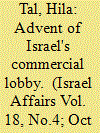

|
|
|
|
|
| Publication |
2012.
|
| Summary/Abstract |
The commercial lobby phenomenon first emerged in Israel in the 1990s and has since expanded at an impressive pace. There are more than 100 commercial lobbyists authorized to work in the Knesset, and commercial lobbyists in Israel represent more than 400 clients. This article describes the factors that led to the advent of this sector and fostered its rapid growth: globalization and Americanization; changes in the Israeli economic system; liberalization and weakened political parties; and the ban against Knesset members engaging in additional occupations. The article concludes by discussing potential developments in Israeli lobbying.
|
|
|
|
|
|
|
|
|
|
|
|
|
|
|
|
| 2 |
ID:
116187
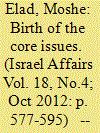

|
|
|
|
|
| Publication |
2012.
|
| Summary/Abstract |
In the past two decades the Israeli-Palestinian conflict has been identified with the dispute over four core issues: the future of East Jerusalem, the Jewish settlements in the disputed territories, the final borders between the two sides, and the fate of the Palestinian refugees. The first three issues were born during the first 10 years of Israel's control of the West Bank and East Jerusalem, while the refugee problem dates back to the 1948 war. Yet it was the Israeli administration from 1967 to 1976 that exposed the refugee camps to the Israeli public and led to initial efforts to resolve this problem. This first half of the two-part article outlines the establishment of the Israeli administration in the West Bank and East Jerusalem and lays the ground for the creation of the core issues which will be described in the second part.
|
|
|
|
|
|
|
|
|
|
|
|
|
|
|
|
| 3 |
ID:
116191


|
|
|
|
|
| Publication |
2012.
|
| Summary/Abstract |
This article is based on a series of interviews with 73 individuals who participated in the 1948 war. Though the war had many physical as well as emotional casualties, surprisingly a relatively small portion of individuals were willing to admit the occurrence of combat stress reactions. This finding is quite puzzling in the face of the drastic course of the war. Hence, it is speculated that denial and suppressive processes underlie the interviewees' declarations. Moreover, it is assumed that this denial process is part of the construction of a monolithic social identity. The origins of this process and its implications for Israeli social identity are discussed.
|
|
|
|
|
|
|
|
|
|
|
|
|
|
|
|
| 4 |
ID:
116183
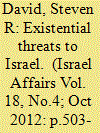

|
|
|
|
|
| Publication |
2012.
|
| Summary/Abstract |
Israel is one of the only countries whose existence is openly called into question. There are a number of contemporary threats that could bring an end to Israel as a Jewish democracy. They include 'hard' threats of nuclear destruction and conventional invasion and 'soft' threats of an emerging Arab majority and elite actions to end Israel either as a Jewish state or as a democratic state. Israeli policymakers can learn how to cope with these threats by examining how Israel was destroyed in ancient times. Israel's destruction at the hands of the Assyrians, Babylonians, and Romans reinforces Realist lessons for contemporary Israel. They include the dangers of relying on outside allies for support, the need to prevent adversaries from gaining the capability to destroy you, the risks of an unfavourable demographic balance, and how internal conflict can bring about one's demise. Although appeasement proved to be the preferred policy for some of Israel's ancient forebears, the total threat posed by some of modern Israel's adversaries and Israel's contemporary ability to overpower its regional foes require substantial modification before such an approach should be considered today.
|
|
|
|
|
|
|
|
|
|
|
|
|
|
|
|
| 5 |
ID:
116186
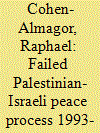

|
|
|
|
|
| Publication |
2012.
|
| Summary/Abstract |
This article examines the major developments that have taken place since the signing of the Oslo accords in September 1993. It analyses the major mistakes made along the way by both sides, showing that brinkmanship is a very dangerous policy when one or both sides are willing to pay a high price in blood. Finally, it offers a blueprint for breaking the deadlock roughly based on the Clinton parameters of 2001 and the subsequent Israeli-Palestinian Geneva Accords.
|
|
|
|
|
|
|
|
|
|
|
|
|
|
|
|
| 6 |
ID:
116190
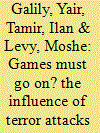

|
|
|
|
|
| Publication |
2012.
|
| Summary/Abstract |
The terrorist campaign against Israel, euphemized as the 'al-Aqsa intifada', affected Israeli society in terms of perceptions of personal security, economic and political stability and aspects such as tourism and culture. The Israeli sporting scene was affected as well. From 2001 to 2004, international sports organizations adopted policies in stark contrast to one another. While some banned certain sports events from taking place in Israel, others obliged athletes to come to Israel and fined them for refusing to do so. A comparison of how these organizations chose to act in similar cases around the world reveals a striking inconsistency. An examination of the events and information provided in personal interviews indicates that sports associations fail to define terrorism and the conditions under which competitions should be banned.
|
|
|
|
|
|
|
|
|
|
|
|
|
|
|
|
| 7 |
ID:
116184
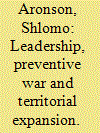

|
|
|
|
|
| Publication |
2012.
|
| Summary/Abstract |
The purpose of this article is to outline and analyse David Ben-Gurion's security policy and alternatives to it offered by others and their role from the run up to the Six Day War of 1967 to this day. The differences are to be sought in Ben-Gurion's emphasis on deterrence, primarily nuclear deterrence, and on the American efforts to thwart this option, which contributed to his resignation in 1963; yet BG's security policy also entailed minimal territorial expansion in the West Bank as a result of renewed Arab aggression, while his successors adopted a preventive conventional war including territorial changes in the West Bank, East Jerusalem included. The ramifications of the Six Day War for the 1973 round of hostilities and for further conventional hostilities all the way to the shadow of the Iranian bomb are discussed.
|
|
|
|
|
|
|
|
|
|
|
|
|
|
|
|
| 8 |
ID:
116188
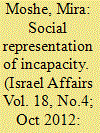

|
|
|
|
|
| Publication |
2012.
|
| Summary/Abstract |
This article deals with the social representation of incapacity in Israeli political culture by applying CDA (critical discourse analysis) to two outstanding cases of incapacity: permanent incapacity in the case of Prime Minister Ariel Sharon as a result of illness and temporary incapacity in the case of President Moshe Katzav, following a police investigation. A social representation of incapacity in leading figures as seen in the headlines of Ha'aretz (an elite Israeli newspaper) was analysed, with the following results: a) in the case of Prime Minister Sharon, he is a warrior battling for his life, while his successors battle for governmental control and stability; b) in the case of President Katzav, he veers between attacker and attacked. The psycho-social analysis of the political-cultural scene indicates that these social representations provide a mechanism for maintaining stability and cushioning shocks while also disseminating a pronounced sense of confusion.
|
|
|
|
|
|
|
|
|
|
|
|
|
|
|
|
| 9 |
ID:
116185
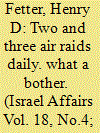

|
|
|
|
|
| Publication |
2012.
|
| Summary/Abstract |
In the summer of 1948, Charles F. Knox, Jr., a career American Foreign Service officer with no prior experience in Middle Eastern affairs, was assigned by the State Department to serve as Counsellor to the initial United States Mission in Israel. White House officials who had overcome State Department opposition to the recognition of Israel in May regarded Knox with suspicion. However, in the course of his service in Israel Knox transcended a Foreign Service milieu that was traditionally hostile to Zionist aspirations as well as his own negative stereotypes about the character of American Jews. The letters Knox sent to family and friends at home, as well as his official dispatches to his superiors in Washington, provide a vivid record of daily life in wartime Tel Aviv as well as a notably sympathetic portrayal of the Israeli people at war.
|
|
|
|
|
|
|
|
|
|
|
|
|
|
|
|
| 10 |
ID:
116192


|
|
|
|
|
| Publication |
2012.
|
| Summary/Abstract |
The article discusses the different views regarding the controversial concept of terrorism, noting that there are many definitions of this concept with no internationally agreed definition. It then examines the US attitude and policy towards terrorism prior to the coming of the Obama administration. It continues by describing the Obama administration's general policy towards the Greater Middle East region and appraises its position on the concept of terrorism and the action of Hezbollah.
|
|
|
|
|
|
|
|
|
|
|
|
|
|
|
|